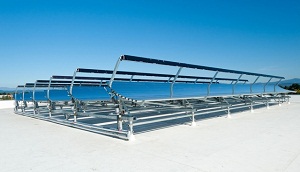Gym at Facebook’s new headquarters will get hot water, power from solar system
 Facebook’s new, 57-acre corporate site in Menlo Park, Calif., will feature a fitness center powered in part by the sun, thanks to a new 60-kilowatt hybrid solar hot water, photovoltaic system from Cogenra solar.
Facebook’s new, 57-acre corporate site in Menlo Park, Calif., will feature a fitness center powered in part by the sun, thanks to a new 60-kilowatt hybrid solar hot water, photovoltaic system from Cogenra solar.
The company has been increasing its presence with a number of new systems both on the consumer-use side and for agricultural processing.
Facebook bought the site from Oracle and is transitioning 2,000 employees to the new location from its current Palo Alto headquarters. The move is slated for completion in December.
Soon after the Cogenra solar system, which uses a reflective trough to concentrate sunlight on photovoltaic cells backed with a solar thermal system that heats water, will be providing Facebook’s athletically inclined employees with hot water in the on-campus fitness center. The system will also help light the 10,613 square foot facility.
It will provide enough hot water for the whole facility on sunny days, said Congenra CEO Dr. Gilad Almogy.
“It’s supposed to generate about 60 percent of the annual [hot water] load,” he said.
The system was sized for its hot water capacity rather than its electricity-producing capacity, because it provides the shortest payback time.
“The short payback is because you’re using everything,” Almogy said.
If the system was sized larger, it would produce more hot water than needed at the facility and the photovoltaics would only operate at their roughly 15 percent efficiency level, reducing the system’s overall efficiency.
“This was obviously the most immediate and straight forward [way to go solar], he said. “There’s potential for more.”
The Facebook solar installation is the latest for the company, which installed its first system at a California winery in November 2010.
“It’s our first in the high-tech campus environment,” Almogy said.
It’s also installed or is installing systems at the University of Arizona, a fertilizer company in California and an Arizona retirement home.
“In the U.S, the awareness of solar hot water is very low, awareness of photovoltaics higher,” Almogy said.
However, once companies are shown the economics and the technology, Cogenra’s approach gains traction with them. As such, the company will have a bigger pipeline in 2012.
“We’ll have quite a few other projects,” Almogy said.
The projects will be in various market segments, across different geographies and even internationally.



